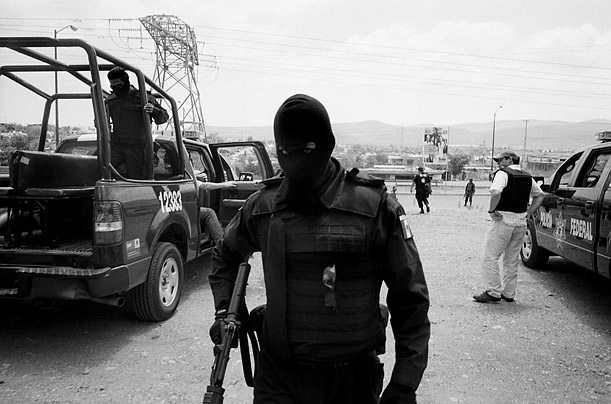President Felipe Calderon’s reliance on the army in Mexico’s war on drugs was shaken in the past days with the arrest of three generals and a lieutenant colonel on corruption charges.
With Mexico’s presidential election just six weeks away and political campaigns in full swing, supporters allege that at least one of the arrests is politically motivated.
Most shocking was the detention of retired major general Tomas Angeles, a close aid to Defense Minister Guillermo Galvan and a soldier with a sterling reputation.
Angeles was the second highest-ranking officer in the ministry during the first two years of Calderon’s administration and had been seen as a likely candidate for defense minister until his retirement in 2008.
Soon after taking office in December 2006, Calderon launched a fierce crackdown on Mexico’s powerful drug cartels, relying heavily on soldiers deployed to crime-ridden regions and often used them to replace corrupt local and state police.
Angeles was arrested on May 15, the same day as Brigadier General Roberto Dawe, who is in active service and was assigned to a base in the state of Colima, on Mexico’s Pacific coast and a key transit route for illegal narcotics heading north into the lucrative US market.
Two days later officials arrested retired brigadier general Ricardo Escorcia, the defense ministry said.
And on Friday, the defense ministry arrested Silvio Hernandez Soto, a retired lieutenant colonel, in connection with the case of the three generals.
A prosecution source who spoke on condition of anonymity said the arrests are related to bribes allegedly paid by the Beltran-Leyva drug cartel, a group that Mexican security forces have crippled in the past years.
Federal anti-drug prosecutors said they interrogated Angeles and Dawe, and on Thursday ordered that they remain in custody. Under Mexican law, authorities can hold suspects for up to 40 days without pressing charges.
Escorcia and Hernandez are being held for a first interrogation, after which officials will determine if they will be held or released.
The men are part of “an investigation for crimes relating to organized criminal activities,” the federal prosecutor’s office said in a statement.
The probe is being carried out “with full respect for their rights,” and it “lacks any political connotation or any relationship with the current (political) campaigns,” the statement read.
Angeles’s lawyer, Alejandro Ortega, told Milenio radio that the bribe allegations are based on hearsay, and that the accusers “had never seen” the general.
Adriana Angeles, the general’s daughter, told the daily Reforma that her family is convinced that the arrest “has been tainted by politics,” suggesting it is retaliation for her father’s role at a May 9 forum on security organized by a group linked to the opposition Institutional Revolutionary Party (PRI).
The PRI’s candidate, Enrique Pena Nieto, is on a direct path to be Mexico’s next president: he has a 20-point lead over Josefina Vazquez, candidate for president Calderon’s National Action Party (PAN) and is comfortably ahead of all other candidates.
At the May 9 forum, Angeles openly criticized Calderon’s anti-drug strategy, saying that there was no overarching strategy and there was a lack of defined goals. He also acknowledged human rights violations in military operations.
“Where there is injustice, inevitably there is violence,” Angeles said at the event.
Angeles’s arrest is a “shameful” affair that “damages the dignity of the army,” federal deputy Luis Garfias, himself a former general, told the daily La Jornada.
Since 1997 at least eight Mexican army generals have been investigated for corruption linked to the illegal drug trade. Of these, only one was exonerated of the charges.
The highest-ranking general to fall was major general Jesus Gutierrez Rebollo, who worked for attorney general’s office as the country’s top drug czar.
Gutierrez was arrested in 1997 and eventually sentenced to a lengthy prison sentence on charges of accepting bribes from Amado Carillo Fuentes, the head of the Ciudad Juarez drug cartel, and helping protect his organization.
More recently, on April 20, general Mario Arturo Acosta Chaparro, who was in prison for nearly seven years on charges of protecting a drug lord but was eventually exonerated, was shot in the head three times and killed in Mexico City.
Pena Nieto said that, if elected, he will continue using the army to battle the drug cartels.










